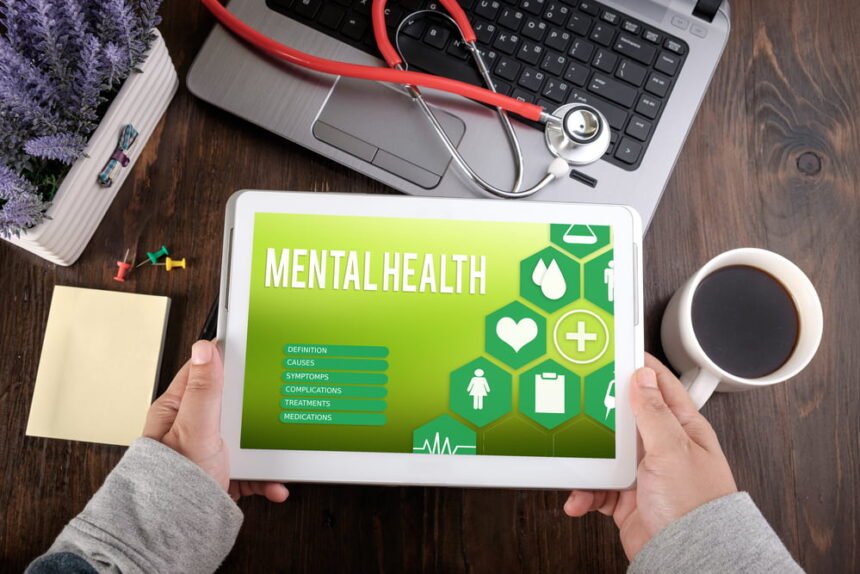The problems caused by mental disorders should never be underestimated. The National Alliance on Mental Illness reported 21% of the adult American population suffers from mental disorders — it’s 52.9 million people. Anxiety is a part of life for 40 million adults in the country. The issue is severe.
Unfortunately, mental illness causes very serious problems in our lives. We talked about how more attention needs to be paid to it in our post Mental Illness is More Malignant than Melanoma.
Mental health apps provide a unique opportunity to increase the efficiency of mental disorders treatments and availability of them, reports NCBI. The American National Institute of Mental Health and the UK National Health Service pointed out that smartphone-based mental healthcare apps are an effective and scalable way of filling gaps in the mental disorder treatment process. In simple words, mental health apps are not an alternative but a great addition to mental disorders treatment. This article will outline the top five ideas among many in the niche.
Types of Mental Health Apps
There are many different subcategories among them, from cognitive health monitoring apps (Miro by Diversido) to group therapy solutions (Pace) to apps for better sleep (Deep). Let’s go through the most popular options.
1. Anxiety and mood control
Such apps focus on transforming the way patients feel about their anxiety and experience its symptoms. They are a great example of how technology can alleviate depression and anxiety. They allow users to track anxiety thoughts, identify distorted and negative thinking patterns, and reevaluate thinking about worrying things. This self-reported data can be exported and discussed with therapists to build an effective treatment process — or users can analyze it themselves, gaining a better understanding of what triggers their anxiety and what alleviates it. Some of the apps to use for anxiety and mood control are Mindshift, Talkspace, and CBT Thought Diary.
2. Mental disorders
The purpose of mental disorder apps is to make therapeutic techniques more accessible and cost-effective for patients. While such apps won’t substitute therapy, they can be a great supplement for patients to manage health concerns and treatments. This effect is achieved by letting patients learn coping strategies, break counterproductive habits, identify triggers, and many more. Some worthy mental disorder apps are Mindshift, Quit That, What’s Up, and MY3. Many platforms for mental health that focus on mental illnesses also allow users to connect with therapists via the telemedicine marketplace model.
3. Women’s health
Women’s health applications like Eve – Glow, Clue, and Natural Circles — are mostly focused on tracking fertility periods and educating women about their bodies. Such apps help predict ovulation, provide personalized health information, or, in case the app’s focused on maternal health, guide future mothers through pregnancy (or through postnatal depression) Women’s health apps rely on information that women provide (e.g. basal body temperature, date of the last period, symptoms they’ve faced during menstruation, weight fluctuations, etc).
4. Sleep app
Sleep app trackers analyze users’ movements, sounds, and behaviors as they sleep to portray the duration and quality of their sleep. They gather vitals from wearable trackers like Fitbit or Apple Watch (but, if it’s a full-blown IoT solution, they have their own sensor device like Oura Ring, an IoT suite for sleep apnea). They detect when a user goes to bed, when they fall asleep and when they wake up; track their heart rate, blood pressure, sounds around them to provide a clear image of their night. Some of the popular sleep apps are SleepScore, Pillow, SleepCycle, and SleepWatch.
5. Meditation app
Regular meditation is a scientifically proven way to fight stress, control anxiety, and improve emotional well-being. The last few years have been pretty dark, and meditation apps have become very popular — with meditation, users learn to face negative emotions without letting them take control of their lives; without diving into self-destructive and harmful behaviors. Meditation apps usually contain a set of instructional materials in various formats. Users set their time of daily practice and choose between guided or silent meditations. A few examples of apps to check out for inspiration for a meditation app are Calm, Simple Habit, and Unplug.
Examples of Famous Mental Health Apps
Here are the examples of six popular mental health apps that stick to a scientific, evidence-based approach to help patients.
Moodfit
Moodfit is a “fitness” app for your mental health. It has:
- Breathing practices;
- PHQ-9 and GAD-7 mental health assessments;
- Sleep & Lifestyle tracking;
- Mood journals.
Moodfit aims to reduce stress and help users gain control over their emotions.
MoodMission
MoodMission focuses on helping users who are depressed and anxious to cope with their conditions. This is done by assigning users physical, behavioral, or emotional “missions” based on users’ mood testimonials.
Other gamification features such as achievement badges encourage users to complete these “missions”. The efficiency of MoodMission techniques is backed by a randomized controlled trial.
Talkspace
Talkspace is a HIPAA compliant service that provides users with licensed therapist assistance in confidential chats. Benefits of Talkspace include:
- Only licensed therapists (a company does background checks/interviews for each of them);
- Seamless switch of a professional;
- 60-second assessment test to match users with the right therapist.
The app features individual and couple therapy, medication management, and psychiatry services.
Sanvello
Sanvello app is built for people who face anxiety, depression, and stress. It helps users gain healthy habits, focus on self-care, and increase self-awareness. Sanvello achieves these tasks through:
- Self-tracking tools: users have to observe their mood, sleep patterns, learn to track different sources of anxiety;
- Setting goals that might make users feel better;
- Talking with qualified coaches who guide users in private or group chats.
What is great about Sanvello is that the app relies on principles of mindfulness-based cognitive therapy. These strategies proved their efficiency in fighting depressive relapse and anxiety.
Calm
Calm is a meditation app aiming at stress relief, reaching mindfulness, and elevating users’ moods via guided meditations. Top features of the Calm app include:
- Various breathing exercises;
- Sleep stories feature to help fight insomnia and other issues with sleep;
- Mindfulness tools for kids.
Calm relies on evidence-based Mindfulness-Based Stress Reduction programs. With Calm, users get a customized meditation experience — they choose a type of meditation session based on their goals.
Happify
The purpose of Happify is to help people fight anxiety, achieve stress relief, focus on positive thinking and lead happier lives. Happify relies on the set of features to fulfill its purpose:
- Accessibility features (font-resizing, high-contrast mode, the notification with warnings that proceed activities that might involve significant audio or video components — for users not to get overwhelmed);
- Progress statistics;
- Digest of positive news.
There are two principal merits of the Happify app. First is the scientific-based approach of the app. Second is the wide range of activities like guided meditation and self-assessment exercises to help users achieve specific goals for mental health.
To sum up, mobile mental health apps act as an excellent supplement for therapeutic and psychiatric treatment. If you’re seeking ways to contribute to society’s mental health well-being, make sure to involve people who’re dealing with depression, mood swings, or whatever you want your app to focus on. They will help you implement features they truly need that have been truly helpful (or lacking) in other solutions for mental health.







